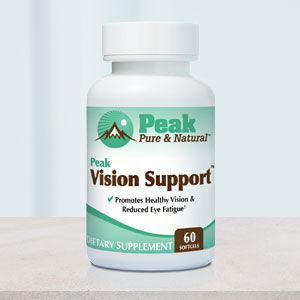Get Easy Health Digest™ in your inbox and don’t miss a thing when you subscribe today. Plus, get the free bonus report, Mother Nature’s Tips, Tricks and Remedies for Cholesterol, Blood Pressure & Blood Sugar as my way of saying welcome to the community!
How vitamin C helps patients survive sepsis and go home sooner

My high school biology teacher said one thing that stuck with me for years: taking vitamin C when you have a cold doesn’t work. It’s bologna. Save your money.
I don’t remember why we were talking about vitamin C and colds in biology class. But I do know why this comment stuck with me… it was the opposite of what I was being taught at home.
Anytime I started to sniffle, my mom would give me vitamin C and immune-boosting herbs. And it usually helped.
Now, my biology teacher was a smart, nice guy. And, truthfully, the scientific evidence proving vitamin C’s impact on colds is mixed. Sometimes it seems to help, other times not. But there’s one thing even skeptical scientists like him can’t deny…
Vitamin C has an astounding effect on the immune system. It affects the function of a lot of different immune cells, including white blood cells and phagocytes (cells that protect your body from foreign invaders). And more than 148 animal studies show that vitamin C may ease or prevent infections caused by bacteria, viruses, and protozoa.
But the biggest evidence for vitamin C’s powerful immune-boosting prowess just came out…
A new study shows vitamin C can help people survive one of the most dangerous infections of all — sepsis.
How vitamin C helps people survive sepsis
A new study from researchers at Virginia Commonwealth University shows that vitamin C transfusions can help people survive sepsis.
In case you don’t know, sepsis is a system-wide infection. It occurs when your immune system releases chemicals into the bloodstream to fight an infection somewhere else in your body (like pneumonia, a bladder infection, kidney infection, stomach infection, etc.) but things go awry. The immune system goes into overdrive triggering body-wide inflammation and a real risk of organ failure and death.
Sepsis causes more deaths in U.S. hospitals than anything else. And according to sepsis.org, pneaumonia is a common trigger for sepsis. That’s especially concerning during flu season since influenza is one of the most common causes of pneumonia.
So finding a way to reduce the lives lost to this dangerous infection is important. And it sounds like vitamin C may do just that.
Related: The diet that makes you susceptible to sepsis
In the study, researchers gave intravenous vitamin C therapy to some patients with sepsis and a placebo to others. The patients in the vitamin C group fared better than the others…
Vitamin C reduced the risk of death by 16 percent within 28 days. It also helped people get out of the Intensive Care Unit three days earlier and go home from the hospital a week earlier.
“This therapy could potentially transform the way we care for sepsis patients. We may have found a lifesaving therapy,” said first author Alpha A. “Berry” Fowler III, M.D., a professor in the Division of Pulmonary Disease and Critical Care Medicine in the Department of Internal Medicine at the VCU School of Medicine. “While further research is needed, the results from our preliminary study are encouraging.”
Start taking vitamin C seriously
So clearly, vitamin C isn’t hogwash no matter what my high school biology teacher said. My recommendation?
Get plenty of vitamin C so your immune system prepared to fight off infections big and small. And don’t wait until you’re already feeling sick. Get enough vitamin C daily.
Dietary guidelines suggest you get between 65 and 90 milligrams of vitamin C per day, but you can take up to 2,000 milligrams per day without any side effects. You don’t have to take a vitamin C supplement daily (unless you want to) but you do need to eat plenty of vitamin C-packed foods, like:
- Cantaloupe
- Oranges
- Grapefruit
- Kiwi fruit
- Mango
- Papaya
- Pineapple
- Strawberries, raspberries, blueberries, and cranberries
- Watermelon
- Broccoli
- Brussels sprouts
- Cauliflower
- Green and red peppers
- Spinach, cabbage, turnip greens, and other leafy greens
- Potatoes
- Sweet potatoes
- Tomatoes
- Winter squash
Editor’s note: Did you know that when you take your body from acid to alkaline you can boost your energy, lose weight, soothe digestion, avoid illness and achieve wellness? Click here to discover The Alkaline Secret to Ultimate Vitality and revive your life today!
Sources:
- New study links vitamin C therapy to better survival rates after sepsis — MedicalXpress
- Effect of Vitamin C Infusion on Organ Failure and Biomarkers of Inflammation and Vascular Injury in Patients With Sepsis and Severe Acute Respiratory Failure: The CITRIS-ALI Randomized Clinical Trial — JAMA
- Vitamin C and Infections — Nutrients
- Can vitamin C prevent a cold? — Harvard Health Publishing
- Vitamin C — MedlinePlus
- Is it possible to take too much vitamin C? — Mayo Clinic














